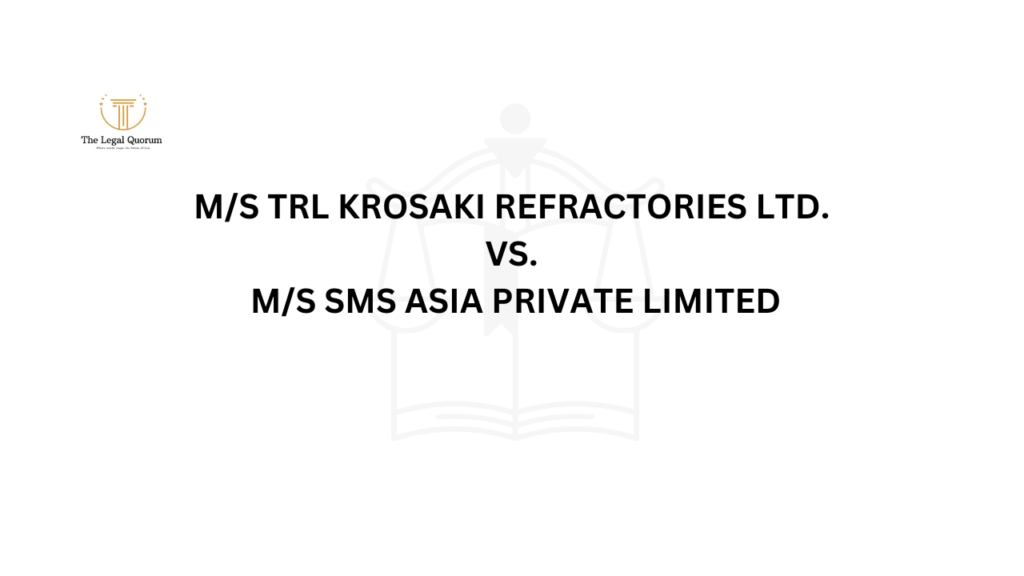Published On: 4th August, 2024
ABSTRACT
Arbitration and Public Policy are closely linked in the domain of alternative dispute resolution. Arbitration has become a popular mode of resolving disputes between the parties, and its intersection with public policy has become a question of debate. Public policy considerations may influence the arbitrability of disputes. Furthermore, arbitration can also shape public policy by providing a means for resolving disputes in areas where there is a legislative gap. Public Policy has been likened to an unruly horse, unpredictable and difficult to tame similarly, the relationship between arbitration and public policy is difficult to predict and hence, the interplay between the two may sometimes lead to severe disputes which hampers justice delivery and rights of the parties.
INTRODUCTION
Arbitration is a form of Alternative Dispute Resolution. The idea is to settle the wrangle between the parties as soon as possible without becoming bogged down in the trivialities of a civil court’s procedure. In Collins v. Collins, ROMILLY MR defined the word Arbitration as “An Arbitration is a reference to the decision of one or more persons, either with or, without an umpire of a particular matter in difference between the parties.” [1] The Oxford Dictionary defines arbitration as ‘the official procedure of resolving a dispute or disagreement by someone who is not engaged as a party to the dispute.’
The convergence of the enforcement of arbitral awards with public policy has been a point of contention. Public policy in general can be defined as the common conscience of the public at large which influences policy-making. If any statute, order, policy, or arbitral award, violates public policy and is likely to adversely affect the administration of justice, the court can declare it as null and void.
This article deals with the doctrine of public policy, its need, and how the doctrine thrived in the Indian legal system and also how to harmonize public policy considerations with arbitration for smooth enforcement of an arbitral award.
KEYWORDS
Arbitration, Public Policy, The Arbitration and Conciliation Act, 1996, UNCITRAL, New York Convention.
PUBLIC POLICY AND ITS NEED
The Public Policy doctrine is a common law doctrine, it means what is good for the people and what is detrimental to them. In other words, it can be stated as a law of conscience, or norms set by the society to regulate acts pro et contra. Although the phrase is intuitive and well-known, its interpretation is very flexible, depending on the legal domain it is intended to be used in, such as administrative or commercial law, or the civil or criminal jurisdiction.
The United Nations Convention on Recognition and Enforcement (UNCITRAL) Model Law which acts as a standard model for national arbitration laws states the grounds on which an arbitral award can be set aside by the national courts, under clause 1(b) of the article 34 it has been stated that if the court finds that:
- the subject matter of the dispute is not capable of settlement by arbitration under the law of this State; or
- the recognition or enforcement of the award would be contrary to the public policy of this State. [2]
The same reasons are listed in Article V of the 1958 Convention on the Recognition and Enforcement of the Arbitral ruling, commonly known as the New York Convention, the national court may refuse to enforce the arbitral award but the national courts are not given any instructions by the New York Convention about the proper interpretation of the public policy defence. In India, the 2015 amendment of the Arbitration and Conciliation Act, 1996 clarified that an award can be set aside on the ground that it is against the public policy of India if –
- the award is vitiated by fraud or corruption;
- it is in contravention of the fundamental policy of Indian law;
- it conflicts with basic notions of morality and justice.
Further, it is clarified that the grounds of “patent illegality” to challenge an award cannot be taken in international arbitration, and the same will be available only in domestic arbitrations.[3]
In the process of arbitration, there are certain impediments such as an arbitrator can become biased towards the wealthier party which might influence the decision making, and the poor party may eventually suffer. Therefore, through public policy, the courts set foot in and provide justice based on equity, justice and good conscience. Hence, the doctrine ensures that justice is not evaded due to a lack of judicial intervention. In the case of Soleimany v Soleimany [1998] APP.L.R. 02/19 [4] it was observed that it is the courts’ responsibility to preserve the integrity of the arbitral procedure. Public policy cannot be permitted to supersede private agreements that violate this integrity or other basic principles or legal regulations. In countries like India where private agreements are more prone to get negatively impacted due to corruption, in such circumstances public policy provides support to the process of arbitration and also prevents the parties from manipulating the arbitration clause according to their convenience. Another factor for the need for public policy is the mitigation of harm posed to third parties by agreements between two private individuals. An arbitral award that is decided outside of the purview of the court might not always pay heed to the effects of such an agreement and its enforcement upon third parties who are not privy to this information.[5]
PUBLIC POLICY CONSIDERATIONS: INDIAN PERSPECTIVE
Public Policy in India in general construed and includes principles of morality, justice and laws enacted to protect the public interest at large. Courts in India have the power to nullify an arbitral award if it goes against these basic principles. Section 34(2)(b)(ii) and Section 48(2)(b) of the Act [6] state that the court may set aside and forbid to enforcement of an arbitral award if it seems contradictory with the concept of public policy of the nation. The Act does not provide for the meaning of the said term yet the judiciary tried to decode the term in a plethora of cases which not only provides a meaning to the term but also showcases the different angles as to how the phrase “public policy” unravelled in the due course.
Public Policy is an unruly horse and has been known to throw even the most experienced legal riders. However, the Indian approach to public policy in arbitration seeks to strike a balance between upholding the integrity of the arbitration process and safeguarding public interest. The Supreme Court in numerous cases is of the view that it is a vital consideration in ensuring arbitration awards align with the fundamentals of the Indian legal system.
In the case prior to the 1996 Act, that is, Renusagar Power Electric Company v General Electric Company [7]the Supreme Court explained the expression ‘public policy’. The court stated that in Section 7(1)(b) of the Foreign Awards Act, the public policy must construe with the Private International Law. In addition, the court held that the term must be applied in a narrow sense and it requires more than just a violation of Indian Laws, to attract the bar of public policy. Further, it was enunciated that the enforcement of foreign awards would be refused on the ground that it is contrary to public policy if such enforcement would be contrary to
- fundamental policy of India; or
- the interest of India; or
- Justice or morality.
In the case of Oil & Natural Gas Corporation Ltd. v Saw Pipes Ltd.[8], the Hon’ble Supreme Court observed that if the award is contrary to the substantive provisions of law or Act or against the terms of the Contract, it would be patently illegal, which should affect the rights of the parties, hence, such an award can be set aside by the court under section 34 of the Act. Further, the court added that the expression of public policy varies from generation to generation and from time to time. It was also observed that a narrow approach would invalidate certain provisions of the Act, so a broad interpretation is the requirement of the statute to exempt ‘patently illegal’ awards. In the case of Phulchand Exports Ltd. v OOO Patriot,[9] the apex court while deciding the purview of Section 48 of the Act of 1996, stated that the criterion set in ONGC v SAW[10] pipes must be followed in foreign awards, consequently widening the term public policy under section 48(2)(b). This case brings the domestic awards as well as the foreign awards on the same page. But the aforementioned case was soon overturned by the apex court in the ruling of Shri Lal Mahal Ltd. v Progetto Grano Spa,[11] and established the pronouncement given in the Renusagar case.
The Hon’ble Supreme Court while deciding the question which constitutes a ‘fundamental policy of Indian law’ in the case of ONGC Ltd. v Western Geco International Ltd.[12] held that the decision of SAW Pipes does not elaborate on this aspect. Considering the term, the court affirmed principles hereinafter mentioned-
- Judicial Approach- Any court, tribunal or any other authority while making decisions, must apply their judicial minds and abstain from being arbitrary, which would affect the rights of citizens or have civil repercussions.
- Principles of Natural Justice- Every court and quasi-judicial authorities should follow the principles of natural justice and the parties should be given equal opportunities to be heard.
- Wednesbury Principle- If the decision of a court or tribunal is so unreasonable as to be indecipherable to a prudent person, it shall not stay in the court.
In National Agricultural Cooperative Marketing Federation of India (NAFED) v Alimenta S.A.,[13] the Apex Court considered that the defence of public policy under Section 7(1)(b)(ii) of the Foreign Awards Act was interpreted narrowly. The court set aside the ruling by construing the term widely by relying on the guidelines of the Renusagar case.
In Government of India v Vedanta Ltd.,[14] this case as well court relied on the ruling given in Renusagar and held that the public policy comprised of the fundamental policy, morality and justice, and interest of India. The court also held that a contractual provision fallaciously interpreted by the tribunal cannot be held as a ground to challenge the award on merit.
In the most recent decision in Avitel Post Studioz Limited v HSBC PI Holding (Mauritius) Limited,[15] the Supreme Court of India rendered a pivotal decision. It held that the enforcement of an award can only be refused when the most fundamental notion of morality and justice is violated.
ESTABLISHING EQUILIBRIUM BETWEEN THE TWO
It is clear that the social, political, economic, and religious characteristics strongly determine the legal system and the public policy of a State. Therefore, to create a balance between the two major aspects of law and to avert convergence it is significant to take into account all the variables pertaining to the law of the land.
There could be a few determinants that should be taken into account by the parties, the Arbitrator or the tribunal while giving an arbitral award;
- The subject matter of arbitral award should not oppose the laws of the state enforcing it. Like, an award promoting Gambling cannot be enforced in India.
- The process of Arbitration should sustain the principles of Natural Justice and Equity. The tribunal should not arbitrarily decide a matter in favour of one party.
- Awards that are to be enforced should not pose any threat to public health and safety.
- The awards against the morality of society should remain futile.
- Any award encouraging any sort of fraud or corruption in the enforcing state should be set aside.
- All awards should possess and respect international norms and standards.
- Arbitrators and the parties should acknowledge the Judicial Review in view of Public Policy, so as to create harmony between Public Policy and Arbitration.
- While enforcing an award, the cognizance of public as well as private international law should be taken.
CONCLUSION
The process of Arbitration and Public Policy is regulated by the nuanced legal framework, in India. Arbitration as a dispute resolution mechanism can only succeed if it upholds the considerations of Public Policy. Hence, creating a balance to ensure the efficacy of arbitration and safeguarding public interest is sine qua non. Public policy is indeed an unruly horse yet it can be reined. The courts in India constantly working towards boosting arbitration autonomy as well as prioritizing public policy. The awards should uphold morality, justice and public interest for its recognition.
Reference(s):
[1] Naveen Aladia, Arbitration & Conciliation: A Comparative Analysis, 5 (2017).
[2] Patrick Oliver Ott, UNCITRAL – United Nations Commission On International Trade Law, in A Concise Encyclopedia of the United Nations 692 (Helmut Volger ed., 2010), https://brill.com/view/book/edcoll/9789047444541/Bej.9789004180048.i-962_122.xml.
[3] The Arbitration and Conciliation Act, 1996, Act No. 26 OF 1996(India)
[4]Soleimany v Soleimany 1998.pdf, http://www.nadr.co.uk/articles/published/ZzzzzarbitrationLawReports/Soleimany%20v%20Soleimany%201998.pdf.
[5] adrc183, Arbitration and The Public Policy Exception: Necessary Precaution Or Controversial Impediment, CADR (2023), https://www.rgnulcadr.in/post/arbitration-and-the-public-policy-exception-necessary-precaution-or-controversial-impediment.
[6] The Arbitration and Conciliation Act, 1996, Act No. 26 of 1996(India)
[7] Renusagar Power Co. Ltd. v General Electric Co., MANU/SC/0195/1994
[8] Oil & Natural Gas Corporation Ltd. v SAW Pipes Ltd., MANU/SC/0314/2003
[9] Phulchand Exports Ltd. v OOO Patriot, MANU/SC/ 1217/2011
[10] Oil & Natural Gas Corporation Ltd. V SAW Pipes, MANU/SC/0314/2003
[11] Shri Lal Mahal Ltd. v Progetto Grano Spa, MANU/SC/0655/2013
[12] Oil & Natural Gas Corporation Ltd. v Western Geco International Ltd. (2014) 9 SCC 263
[13] National Agricultural Cooperative Marketing Federation of India v Alimenta S.A. MANU/SC/0382/2020
[14] Government of India v Vedanta Ltd. and Ors. MANU/SC/0689/2020
[15] Avitel Post Studioz Limited and Ors. V HSBC PI Holdings (Mauritius) Limited, MANU/SC/0260/2024




